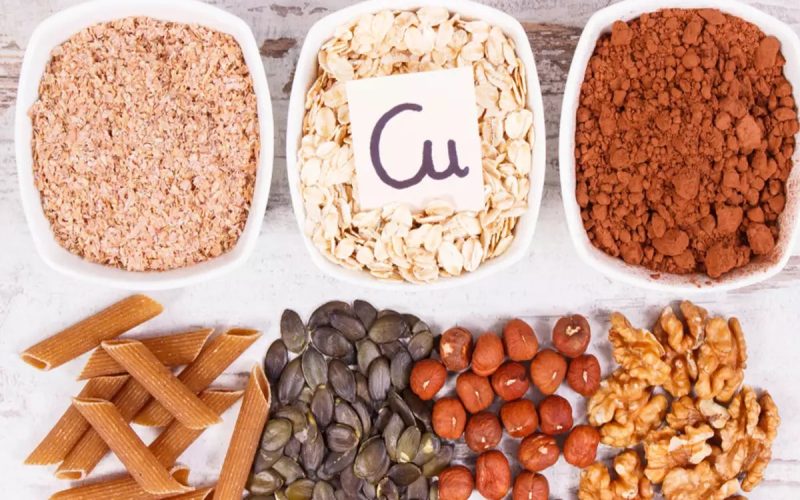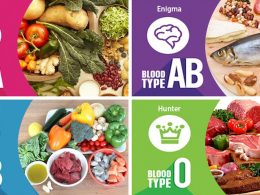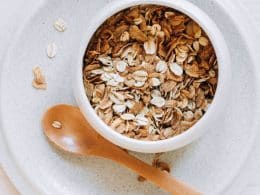Copper is a heavy metal with a lot of benefits for your body, your body needs this essential mineral to maintain the strength of your bones, protect your heart, boost your immune system and many much more which we will be looking at in this post.
It is found in all tissues of your body like the skeletal muscles, kidneys, heart, brain, and liver where it is needed for important roles and functions like making new red blood cells. It also helps your body produce energy.
A deficiency in this important mineral is rare because the body stores copper in the liver but when it occurs, it can cause health problems such as iron deficiency which can lead to anemia, Menkes disease, dysfunction of the immune system, and problems with the nervous system.
Too little or excess of copper in the body can affect the functions of your brain, excess copper has been linked to Wilson’s disease, a condition where there is too much copper in the organs and also neurological diseases.
Health Benefits of Copper
1. Prevents the Growth of E. Coli
Studies have proven the ability of copper to destroy and prevent the growth of E. Coli a strain of bacteria responsible for certain infections. Copper also boosts your immune system and reduce the energy your body uses in fighting infections.
2. Fights Arthritis
Copper treats arthritis and relieves its symptoms because it has a powerful anti-inflammatory property.
A common home remedy for arthritis is to store water in a copper vessel overnight and drink it the next day. This will strengthen your muscular system and relieve the symptoms of inflammation. It will also kick start your metabolism for the day and energize you.
3. Improves the Health of Your Thyroid Gland
Copper ensures that your thyroid glands are functioning properly, this prevents thyroid problems and disorders which can affect the body drastically.
However, you should be careful of copper supplements, it can increase the levels of copper in your body beyond normal and this can cause your thyroid gland to malfunction and you can develop either hypothyroidism or hyperthyroidism.
4. Fights Inflammation
Copper fights inflammation, it delays and prevents inflammation and other inflammatory diseases. Due to the powerful anti-inflammatory property of copper, some people wear copper accessories like bracelets and gloves.
However, there are no scientific proofs supporting the use of copper jewelry in fighting inflammatory conditions.
5. Ensures Healthy Formation of Red Blood Cells
The body needs copper for the production of red blood cells, it is also needed for the formation of hemoglobin, a component of the red blood cell responsible for taking oxygen around the body.
Copper also promotes the efficient uptake of iron from food sources thus promoting healthy formation of red blood cells.
6. Promotes Proper Growth
Copper promotes normal growth and development and good health. It protects the skeletal system and also the cardiovascular and nervous system. A deficiency in copper affects the growth and development of the affected individual and this is more severe in newborn babies.
Copper deficiency is one of the leading causes of birth and growth defects in children of third world countries.
7. Lowers the Levels of Cholesterol
There are lots of studies showing the ability of copper to reduce the levels of bad cholesterol (LDL) in the body.
At the same time, it also increases the levels of good cholesterol (HDL) and this, in turn, will reduce the risk of cardiovascular diseases such as arthritis, atherosclerosis, stroke, and heart diseases.
8. Fights Oxidation
Copper also has a powerful anti-inflammatory property because it contains antioxidants which fight inflammation. It reduces the production of free radicals which damage your cells, tissues, and organs.
When the more free radicals are produced in the body without the help of an antioxidant like copper to fight it, this will lead to the formation of chronic diseases and cancer.
9. Protects your Skin from UV Light
Copper has natural sun protection, it boosts the production of melanin which acts as a natural sunblock against harmful UV rays thus protecting your skin, eyes, and hair.
10. Controls Melanin Production
Melanin is the natural dark pigment produced in the body, this substance is what gives the hair, skin, and eyes its color. Copper is a vital component of melanin, sufficient levels of copper in the bodyguards against graying hair, pale complexion, and rapid aging.
Copper protects the integrity of your skin cells and maintains youthfulness. It also maintains your eye color, and along with zinc, copper keeps your eyes beautifully colored in old age.
11. Supports Healthy Digestion
Copper is used together with zinc in the body to synthesize digestive enzymes, these enzymes help in the breakdown of food and these release micronutrients which the body absorbs and utilize for optimum health.
These nutrients also eliminate toxins from the body and keep your body clean and free of toxins.
12. Improves Heart Health
Copper boosts and protects cardiovascular health, in fact, there is evidence that high levels of cholesterol and high blood pressure are caused by low levels of copper in the body.
A recent study showed that some patients with heart failure will see improvement in their symptoms when copper supplements are added to their diets.
In studies conducted with animals, it was found that there is a connection between low levels of copper and cardiovascular disease.
13. Enhance Skin Health
Copper plays an important role in the synthesis of melanin, myelin, collagen, and hemoglobin and all these are needed for optimum skin health. Hemoglobin boosts the transport of oxygen to your skin thus making your skin glow.
Copper is also involved in the production of elastin, this connective tissue makes your skin firm and flexible. This essential trace mineral also covers the myelin sheath surrounding your nerves thus protecting it.
Copper also prevents premature aging, it makes your skin less prone aging, wrinkles, and sagging.
14. Improves the Immune System
Low intake of copper and copper deficiency affects your immune system by reducing the number of white blood cells, the soldiers of the body which fight germs and diseases.
The reduction in the number of white blood cells leads to a health problem called neutropenia. This disease makes one vulnerable to infection. Regular intake of copper-rich foods will prevent this and support a healthy amount of white blood cells in your body.
15. Boosts Enzymatic Reactions
Copper is an element and it also functions as a co-factor for over 50 different enzymes in the body. These enzymes have various biological and biochemical roles they play and without copper, they cannot function at all and this, in turn, will lead to metabolic diseases.
Various organs and systems of the body cannot function without these enzymatic reactions, the body would cease to function in harmony and the entire metabolism will stop or slow down.
This is mostly important in certain pathways of the brain especially those involving galactose and dopamine.
16. Protects your Bones
A severe deficiency in copper leads to osteoporosis, decreased bone, density, and osteopenia. Osteoporosis is characterized by weak bones and this can make your bones susceptible to fractures. Osteopenia also reduces the mineral density of your bones and it can lead to osteoporosis.
17. Supports the Absorption of Sugar and Iron
Copper supports the absorption of sugar from the foods you eat and this boosts your levels of energy and fights fatigue. It also promotes the absorption of iron from the intestine, this, in turn, fights anemia and prevents abnormalities of the red blood cells.
It also helps the release of iron from the liver, its store site and it promotes proper oxygenation of the whole body. Deficiency in copper leads to anemia also known as iron deficiency.
Anemia has disturbing signs and symptoms such as general weaknesses, digestive problems, muscle aches, fatigue, and all this can be prevented by eating lots of copper-rich foods.
18. Boosts production of Collagen
Copper can protect your skin and delay aging since it has strong antioxidant properties. It fights extrinsic aging (premature aging) and it also boosts the replacement of damaged tissues.
Collagen makes your skin youthful and elastic, it also holds bones together, it is the main structural protein used in making skin, connective tissues and bones.
Insufficient levels of collagen in the body can lead to skin problems, breakdown of connective tissues, and joint dysfunctions.
19. Fights Premature Aging
Copper is a powerful antioxidant and it works together with the antioxidant enzyme superoxide dismutase to protect your cell membranes from the effects of free radicals which lead to rapid aging.
Free radicals are responsible for aging, age spots, wrinkles, cancer, kidney malfunctions, and macular degeneration but regular intake of copper-rich foods can prevent it.
20. Boosts Brain Health
The body needs copper for a lot of neurological processes and growth, it is needed for healthy cognitive functions. Low levels of copper in the body can trigger cognitive decline, so also high levels of copper.
In the medical world, copper is widely known as a brain stimulant, this is why foods with a high amount of copper are called “brain foods”. Copper helps neural pathways to develop in unique ways and it has a link with creative thinking.
Don’t take copper supplements excessively to avoid the risks of toxicity which can damage the brain.
21. Increases the Levels of Energy
Copper increases the production of energy in the body by promoting the synthesis of Adenosine Triphosphate (ATP) the energy currency of the body and it is also the energy storehouse of your body.
When we have sufficient levels of ATPs in our bodies, we will have a lot of energy to go through our day to day activities without feeling weak or tired. Increase your intake of copper-rich foods to enjoy this benefit.
Natural Sources of Copper
You can benefit from copper by including copper-rich foods in your diet, the majority of people get all their copper from natural foods. Supplements are only advisable in cases of severe deficiency or a medical condition needing a high amount of copper.
There is a wide range of natural foods with a good amount of copper and some of them are:
- Nuts like almonds and cashews
- Seafood (spirulina)
- Beans
- Pinto beans
- Soy flour
- Shiitake mushrooms
- Sesame seeds
- Clams, shrimp, oysters (the richest source of copper), crab, and lobsters
- Quinoa
- Wheat bran
- Potatoes
- Avocados
- Dark chocolates
- Organ meats like kidneys and liver from grass-fed animals
- Barley
- Sunflower seeds
- Yeasts
- Garlic
- Whole grains
- Oats
- Cocoa
- Blackstrap molasses
- Dried fruits
- Peas
- Nutmeg
- Beets
- Pulses
- Black pepper
- Groundnuts and peanut butter
- Lentils
- Prawns
- Dark green leafy vegetables
- Rice
- Drinking water stored in copper vessels or passed through copper pipes
Food stored in tin cans have lost their copper contents and also foods with a high content of acids have lost their content of copper.
Risk Factors
Though copper deficiency is rare, there are some factors and medical conditions that put one at risk of being deficient in copper. Some of them are:
1. High intake of vitamin C and Zinc supplements
High intake of these nutrients through supplements may compete with copper in the intestine thus leading to a deficiency in copper.
2. Infants feed with Cow milk
Little children who consume cow milk instead of formula have a copper deficiency because cow milk is low in copper. Children under one year of age who cannot be breastfed due to some reasons should be given manufactured formula and not cow milk.
Apart from copper, cow milk does not have all the nutrients required for the growth of a baby human.
3. Menkes Diseases
This is an X-linked recessive disorder, it affects the ability of your brain to use copper. This can cause failure to thrive in infants of 6 to 8 weeks of age.
It can also cause neurodevelopment delay and short lifespan children with this genetic disease do not live for more than 3 years.
In treating this disease, copper injections are given subcutaneously thus, helping to normalize the levels of copper in the blood.
The type of genetic mutation involved can either make this treatment effective or not. Other causes of copper deficiency are:
- Some medical conditions like inflammation of the optic nerve and myelopathy, polyneuropathy, and demyelination of the central nervous system. Crohn’s disease, cystic fibrosis, and celiac disease also raise the risks of copper deficiency.
- Genetic disorders in copper metabolism
- Problems absorbing copper from the small intestines and this can be caused by metabolic diseases.
- Gastric by-pass surgery impairs the absorption of copper thus raising the risk of a deficiency
- Premature babies are more prone to copper deficiency than healthy babies
Effects of Copper Deficiency
Low levels of copper in the body can generate the following symptoms:
- Thyroid problems
- Brittle bones
- Anemia
- paleness
- Birth defects
- A tingling sensation
- soreness
- Skin problems most especially loss of pigmentation
- Stunted growth
- High levels of cholesterol
- edema
- Low body temperature
- Loss of vision
- Hair loss
- Irregular heartbeat
- anorexia
- Osteoporosis and other bone problems
- Bleeding beneath the skin
- Low amount of white blood cells
- Dermatitis
- Bone fractures
- Dilated veins
Also, studies have linked a deficiency in copper to a lot of health problems and some of them are:
- Anemia, because copper helps in the absorption of iron which is used in making new red blood cells and hemoglobin.
- Increases the risks of infection due to a weak immune system
- Depigmentation of the skin and hair
- Osteoporosis
What About Excess Levels of Copper?
Just like copper deficiency, copper toxicity is also rare but it can happen when one uses copper supplements for a long time. You cannot get copper toxicity from eating natural foods. Other factors that put one at risks of copper toxicity are:
- Cooking with copper vessels
- Drinking water with high levels of copper, this include water stored in copper pipes or well water
- Using chemicals containing high levels of copper
Signs and Symptoms of Copper Toxicity
- Metallic taste in your mouth
- Stomach pains
- Weaknesses
- Nausea and vomiting
- Dizziness
- Diarrhea
- Headaches
Water containing more than six mg of copper can cause stomach pains and trouble, avoid drinking water that triggers these symptoms. More serious side effects can also occur but they are rare and they include:
- Jaundice
- Heart failure
- Heart problems
- Abnormalities in the production of red blood cells
- Higher risks of cardiovascular disease
- Kidney failure
- Liver damage
- Death
Copper Supplements: Safe or Unsafe?
The best way to get any nutrient, whether vitamins or minerals is through foods, however in certain circumstances like in the case of severe deficiency or some medical conditions, doctors can prescribe mineral supplements for you such as a copper supplement.
When prescribed by a doctor, you can take copper supplements but make sure you follow the prescription strictly. You can also let your doctor know that you don’t intend to take it for the long term because mineral supplements like copper raise the risks of toxicity.
You can’t have copper toxicity by eating natural foods rich in copper, you can only have this when you use a copper supplement for a long time. Apart from the risk of toxicity, copper supplements can interact with some medications.
These drugs interact adversely with copper and obstruct the natural balance of copper in the body by making it either too high or too low.
Some of these drugs are birth control pill, hormone drugs, zinc supplements, non-steroidal anti-inflammatory drugs like ibuprofen, penicillamine (a drug used to treat Wilson’s disease by reducing the levels of copper in the body), allopurinol, and medications that treat gastric reflux disease and gastric ulcers.
Symptoms of Copper Toxicity
If you are on copper supplements and you notice any of these symptoms, you should see your doctor immediately.
- Metallic taste in your mouth
- Headaches
- Weaknesses
- Dizziness
- Vomiting, nausea, diarrhea, stomach pains, and other gastrointestinal problems
Severe symptoms of copper toxicity are:
- Abnormalities in the red blood cells
- Cirrhosis
- Heart problems
- Jaundice
Effects of Copper Toxicity
1. Alzheimer’s disease
Excess amount of copper in the bloodstream has been linked to Alzheimer’s. Some scientists hypothesized that when there is an accumulation of copper in organs, it leads to the buildup of amyloid plaques on your nerve cells.
This buildup leads to the formation of neurodegenerative diseases like Alzheimer’s disease.
2. The Central Nervous System
The central nervous system can be affected by too little or excess copper, these conditions can damage the tissues in your brain. These imbalances lead to neurodegeneration in adults.
Excess copper causes oxidative damage in the brain and Wilson’s disease develop when high levels of copper are found in vital organs like the brain and liver.
References;
- Copper in diseases and treatments, and copper-based anticancer strategies. NCBI
- Nitroimidazole and glucosamine conjugated heteroscorpionate ligands and related copper(II) complexes. Syntheses, biological activity and XAS studies. RSC Publishing
- Is the Western diet adequate in copper? Science Direct









